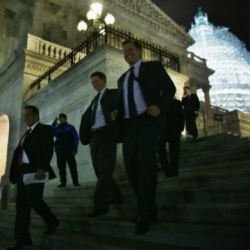Speculation in recent weeks centered around a plan by Senator Harry Reid to get a gambling ban into a Senate omnibus spending bill. That bill was passed in the Senate this past week with no inclusion for Restore America’s Wire Act (RAWA), which would have banned online casinos and poker sites throughout 50 states.
Activist political donor and Las Vegas Sands Corporation President Sheldon Adelson is seen as the chief proponent of the RAWA, which has been championed in the U.S. Senate and U.S. House by Sen. Lindsey Graham and Rep. Jason Chaffetz, respectively. The Huffington Post recently speculated that Harry Reid might be amenable to catering to Adelson’s demands on the online gambling public decade.
Huffington Post Gaming Article
The Huffington Post story read, “The $1.1 trillion [federal] measure would fund most government operations through September of next year, making it a must-pass measure. It also contains dozens of individual policy provisions sought by lawmakers and special interests.” Several special interests were discussed in the story, including the RAWA.
Sheldon Adelson’s Political Crusade
Sheldon Adelson, who holds a fortune of $39 billion from the proceeds of his land-based casino enterprises, has been outspoken in his criticism of online gambling. Adelson believes that particular form of gambling is insidious, because it puts a slot machine in the palm of a person’s hands (via smartphones). As the keynote speaker at the Global Gaming Expo in early October, Adelson spoke passionately of his childhood experiences, in which he grew up poor and saw the fallout among his neighbors of gambling addiction.
Ironically, Las Vegas Sands Corp does offer mobile casino gambling, which involves a similar process to online casinos. In traditional online gaming, players navigate to a casino website or card room with their desktop computer or laptop notebook, then download the casino software which allows them to play games on their computer. In mobile gaming, players navigate to Internet casinos using a tablet computer or smartphone, then downloads casino apps which allow them to play the games on their mobile devices.
Difference in Online and Mobile Gambling
It takes a narrow definition of the term “online gambling” to exclude mobile casinos and poker rooms from the list of dangerous forms of online gambling. That’s especially true when proponents of Restore America’s Wire Act tend to focus on the pervasive nature of cellphones and smartphones in interstate gaming, which Sen. Graham, Rep. Chaffetz, and Sheldon Adelson all have done in the near past.
AGA No Longer Supports Online Gaming
Sheldon Adelson’s stance on online gambling has caused a rift in the American gambling industry. The American Gaming Association, an advocacy group for the collective interests of the U.S. gambling industry, officially changed its position in the summer of 2014 from a pro-online gambling stance to a neutral stance on the issue.
The American Gaming Association’s board of directors has one representative from the largest gaming companies in American, including Las Vegas Sands, Caesars Entertainment, Wynn Resorts, and MGM Resorts. Those heavily-invested in the online gambling industry, such as International Game Technology (IGT) and Bally Technologies, also have a place on the board. Sheldon Adelson was able to force a policy change with the AGA, though it’s clear other members continue to support Internet gaming.
Caesars Entertainment Pleased
For instance, Caesars Entertainment’s Senior Vice President of Government Affairs, Jan Jones Blackhurst, recently told the Las Vegas Review-Journal, “We believe that banning Internet gaming is bad public policy from our perspective. We’re pleased this issue will be discussed openly and not hidden in some omnibus bill.”
U.S. gaming operators no doubt feel the same way. Many of them still discuss the passage of the Unlawful Internet Gambling Enforcement Act in 2006, which was pushed through as an inclusion on the Safe Port Act.
No More UIGEA-Type Inclusions
Though nobody felt the UIGEA could have passed on its own merits, no one in that political climate was likely to vote against a bill that kept American ports out of foreign hands. Thus, America’s online gambling industry was left without the economic infractructure (online payment services) to maintain the industry. Web wallets, credit card companies, and e-vouchers stopped accepting American payments. Casino software providers pulled out of the American gaming niche. This left the online gambling industry in a legal limbo from which it has never quite emerged.
Since 2011, the U.S. Justice Department and several U.S. states (New Jersey, Nevada, and Delaware) have championed online gambling at the state level. Sheldon Adelson and his political allies say such gaming threatens the integrity brick-and-mortar casinos, along with American families.
But for now, no hidden anti-gaming bill will be placed into a spending omnibus. The 2015 legislative session is expected to be a whole new conversation, since the Republicans now control the U.S. Senate. It was the GOP which pushed through the UIGEA in 2006, so the real danger period might be just off the horizon.

